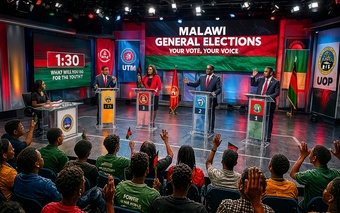Malawians face a critical juncture as they prepare to elect their next leader on September 16, 2025.
The election pits incumbent President Lazarus Chakwera of the Malawi Congress Party (MCP) against former President Peter Mutharika of the Democratic Progressive Party (DPP), alongside 15 other candidates in what has become one of the continent's most closely watched electoral contest.
Beyond the presidential race, Malawians will elect 229 parliamentary representatives across their constituencies and 509 local councilors.
Lazarus Chakwera
President Lazarus Chakwera, 70, embodies the difficulties of governing during economic crisis.
A former theology lecturer and preacher, Chakwera assumed office in 2020 following a historic court ordered rerun after the 2019 elections were nullified due to irregularities. His victory then, carried enormous goodwill from citizens who viewed him as the best alternative.
However, his tenure has been marked by significant economic concerns and persistent corruption allegations. Despite these challenges, Chakwera's administration has achieved notable infrastructure milestones, including the restoration of railway services after three-decades and the construction of major road networks.
Lazarus faces a serious scrutiny by the people after promising to create one million jobs and transform Malawi from poverty to prosperity after winning the 2020 rerun.
He has acknowledged the hardships in the country citing external shocks such as the Russia -Ukraine war as the causes. Nevertheless, he has issued an apology to the country, taking full responsibility for the hardships the are enduring. He asked for forgiveness as he seeks to use this as a crucial last-ditch effort to sway voters to his side.
Peter Mutharika
Peter Mutharika, now 84, represents a return to familiar leadership. He led the country from 2014 to 2020 after defeating the then president Joyce Banda and Lazarus Chakwera.
Before entering politics, Mutharika built his reputation as a law lecturer and practicing attorney, credentials that has shaped his governance approach.
Recent polling by Institute of Public Opinion and Research (IPOR) in Malawi indicates Mutharika leading with 43% support compared to Chakwera's 26%, suggesting voter nostalgia for his administration's relatively lower inflation rates. Voters further indicated that their standard of living under Mutharika was relatively better because everyone was empowered to have what they wanted which is not the case under Chakwera.
However, his candidacy is noted for corruption allegations, economic mismanagement claims and growing concerns about his age and health factors that have dominated public discourse.
Dr. Michael Usi
The incumbent vice president of Malawi submitted his nominations to run for president against Lazarus Chakwera in the upcoming general elections.
He eventually teamed up with Chakwera for the 2020 rerun and won the election. Usi was nominated by the United Transformation Movement Party (UMT) to serve as the vice president when Chilima lost his life in a military plane crush that claimed the lives of everyone onboard.
Usi is representing the newly-formed Odya Zake Alibe Mlandu party, a breakaway faction of UTM party which is in a coalition with President Chakwera’s Malawi Congress Party. He has expressed his appreciation to the president for giving him the opportunity to serve under him.
Joyce Banda
Joyce Banda, 74, of the People's Party represents a third significant option. Banda returns after four years of self-imposed exile despite facing threats of arrest over corruption allegations.
Her tenure was coupled with scandals with the notable one being the Cashgate scandal.
Joyce Banda became the first female of president of Malawi after the death of President Bingu wa Mutharika. She brings experience and a unique political brand as she is known to be very influential among Malawi’s rural poor, though current polling does not favor her.
Other Candidates
The other candidates contesting in the election are Dalitso Kabambe, 51, a former governor of Malawi’s central bank (United Transformation Movement Party); Atupele Muluzi (United Democratic Front), a son of a former president; Bakili Muluzi who governed from 1994 to 2004; Frank Mwenifumbo (National Development Party); and Jordan Saut (Patriotic Citizens Party.
The rest are Akwame Bandawe (Anyamata, Atsikana, Azimayi); Dr. Kondwani Nankhumwa (People’s Development Party); Kamuzu Chibambo (People’s Transformation Party); Thokozani Manyika Banda (Independent); Adil James Chilungo (Independent); Cosmos Felix Chipojola (Independent); Phunziro Mvula (Independent), Smart Mulumbe Swira (Independent) and Milward Tobias (Independent).
Africanelections.org


 Take Voters' Compass
Take Voters' Compass